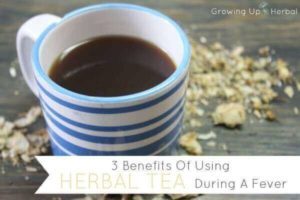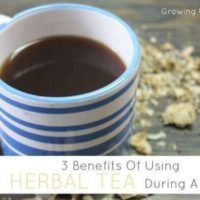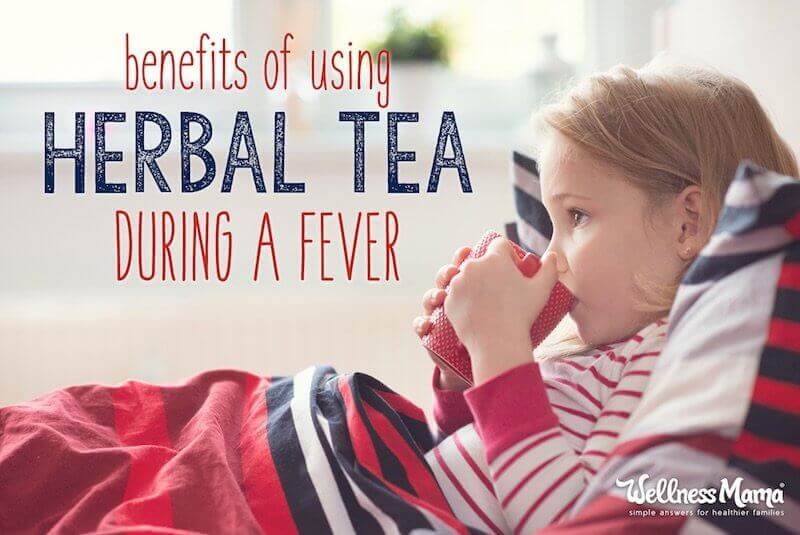My post on why I don’t reduce fevers (and what I do instead) is one of my most popular, and I totally understand why! What parent hasn’t gone through a sleepless night or two … or twenty … worrying about a child with a high fever? Thankfully, fevers aren’t as dangerous as many people fear, and comfort is just a cup of herbal tea away.
How to Use Herbal Tea to Reduce a Fever
Even if research does show (overwhelmingly) that fevers are actually protective and rarely life-threatening, it’s still not fun to have a fever (or watch a child suffering from one). The usual response is to reach for Advil or Tylenol to make them feel better quickly, but this can actually prolong the illness by working against the body’s natural defense mechanism. These medications also have some scary and little talked about risks from frequent and repeated use.
True, I’m a mom, not a doctor, so do read up on the warning signs of the rare fevers that warrant emergency action (more on that below). For most fevers though, herbal tea is an effective and safe natural remedy.
Why Herbal Tea?
Teas are one of the best ways to get the healing benefits of herbs. Steeping herbs in hot (boiling) water make the vitamins, minerals, and antioxidants even more accessible. Herbal tea is also quick to make and tastes good even to kids.
It’s interesting to note that while herbal tea looks and tastes like tea, it actually isn’t tea at all as it isn’t made from Camilla senensis plant, the source of black, green, oolong, and other teas.
As the name suggests, herbal tea results from brewing the leaves, roots, seeds, and/or bark from certain botanical ingredients experts call “tisanes.” Tisanes offer known medicinal benefits and have long been used for health-boosting infusions.
I love my teas (and my coffee), so if you’re like me you probably already have some of the best herbs for fevers, colds, and flu on hand:
Sound tasty?
So how can a cup of tea do what pain reliever can’t? Here are several (research-backed) reasons to reach for a cup of herbal tea the next time sickness strikes:
6 Benefits of Herbal Tea During Fevers
Herbal tea is healthy and delicious in general, but I never thought of it as a fever remedy until a trusted friend suggested it. And research confirms the anecdotal evidence that taking herbal tea during fever is a natural way to:
- Warm and stimulate the body
- Encourage detoxification through sweating
- Provide extra hydration
- Relieve pain and unpleasant symptoms
- Offer immune-supporting vitamins and antioxidants
- Boost mood and relaxation (sleep)
Skeptical? (Or worried what your mother-in-law might think? … No comment!)
Here’s a deeper look at the research-backed reasons why herbal tea is an effective natural remedy for fever:
1. Herbal Tea Warms and Stimulates the Body
Feeling chilled and achy is often one of the first signs illness is approaching. We head for bed and shiver under the covers. Contrary to popular belief, fever is actually a natural signal that the body is going into protective mode by raising body temperature to create a less hospitable environment for bacteria or viruses.
A warming herbal tea helps in this effort by increasing body temperature (as the fever is trying to do), and not just because it’s a hot drink. The properties of certain stimulating herbs work to increase circulation in the body. This is a good thing because it allows white blood cells to get where they need to go faster and fight infection.
Some stimulating herbs especially beneficial for fever are:

Notice these are all commonly used in cooking and known for their pungent fragrance and taste … an easy giveaway of its stimulating effects.
2. Herbal Tea Detoxifies Through Sweating
When fever (supported by stimulating herbs) raises body temperature, the pores of the skin open to allow perspiration in an attempt to cool off and keep the temperature from getting too high. (There’s that amazing self-regulating body again!)
Not only does sweating help cool the body but it also detoxifies and cleanses the body in a natural way by releasing toxins. Fragrant herbs like yarrow, thyme, bee balm, and ginger (also called diaphoretics) support this natural healing mechanism, especially in an infusion like an herbal tea.
3. Herbal Tea Hydrates
It turns out dehydration, not fever, may be the thing to fear.
If hydration is important when we’re healthy, it’s even more crucial when we’re sick. In fact the most important thing to do for a child during a fever is to get fluids into them.
Bone broth or even just plain (filtered) water are great choices — or even this homemade electrolyte drink — but herbal tea offers all the additional benefits listed here as well.
4. Herbal Tea Relieves Pain and Discomfort
When we get right down to it, all we moms really want (besides healthy kids of course) is to have something to offer to make our kids more comfortable when they’re sick. A warm cup of tea might smell and taste great, but it has real benefits for reducing pain as well.
How do non-steroidal anti-inflammatory drugs (NSAIDs) work? They reduce inflammation, the primary cause of pain. Studies show certain herbal teas offer the same analgesic and anti-inflammatory herbs benefits in many cases (without the risk of liver damage and other complications from long-term use).
Peppermint, for example, contains menthol, a known muscle relaxant great for relieving sore muscles and body aches from fever. This study rates turmeric, white willow bark, cat’s claw, and even true green tea as effective pain-relieving herbs, and this study concludes that powdered ginger offers the same pain-relieving benefits as ibuprofen!
Other herbal teas offer relief from congestion, sinus pressure, headache, digestive upset, and other unpleasant symptoms that often accompany a fever. Make an herbal decoction to suit!
5. Herbal Tea Supports Immunity
Herbs like chamomile and mint contain a wide range of nutritional benefits, including being a great source of readily absorbed calcium, magnesium, iron, zinc, and copper. As in the case of healing bone broth, the body can easily digest and soak up all the benefits of herbs prepared as a tea. (Most herbal teas need to steep for 20-30 minutes to for full infusion.)
Chamomile is a highly nutritious herb good for supporting a fever, and it tastes naturally mild and sweet with a hint of apple flavor kids love. I love chamomile so much I keep it on hand in the form of this handy and easy-to-make tincture, which could even be added into any herbal tea before serving.
Nutritional content does vary according to the freshness and quality of the source, so choose organic herbs from a reputable company.
6. Herbal Tea Helps Relaxation (and Sleep)
All the tea and supplements in the world can’t outmatch the benefits of sleep for the immune system, especially when sick with a fever. We all know getting kids to sleep is a challenge (although maybe less so when they’re not feeling well).
Yarrow, catnip, mint, and chamomile are all fever-reducing herbs mentioned above that also promote good sleep. (Herbs for the win again!) I use them all in my Sweet Dreams Sleep Tincture even when the kids are healthy. The same herbs make a great blend for tea, or there are several good sleepytime teas on the market with these ingredients. Again, the quality of the brand matters.
How to Make Herbal Tea for a Fever
I know we’ve covered a number of choices here, so here’s a simple place to start building an herbal arsenal, from sources I trust. Or, you may already have these teas!
If you’re unsure how to make herbal tea correctly, here is a guide from the excellent blog Growing Up Herbal (the expert I mentioned above) to teach you how to make the perfect cup of herbal tea every time!
For other immune-boosting tea recipes, try:
Elderberry Tea – Cinnamon and turmeric (warming and stimulating herbs) work together with the power of elderberries in this simple herbal tea.
10 Health-Boosting Herbal Teas– These are the herbs I keep in bulk and use for teas and tinctures both for sleep and immune support.

Fever Calming Herbal Tea Recipe
Servings
Ingredients
- ½ tsp fresh ginger (minced)
- ½ tsp catnip leaf (dried)
- ½ tsp yarrow flowers (dried)
- 1 tsp peppermint leaf (dried)
- 1 tsp chamomile flowers (dried)
- 1 pinch cinnamon (optional)
Instructions
- Place herbs in a cup or in a tea ball or strainer.
- Boil water and pour into the cup.
- Cover the cup with a plate to keep the steam and important oils in.
- Steep for 10 minutes.
- Strain tea through fine mesh strainer or remove tea bag.
Notes
When I Do Get Concerned About a Fever
I’m not a doctor, but based on my research I seek medical care for a fever when:
- A child under three months has a fever over 100.4 or exhibits any serious symptoms
- Child exhibits a fever over 104 as this can signal a more serious infection or poisoning
- Fever for more than two consecutive days
- The ill person has other symptoms like stiff neck, listlessness, or sensitivity to light
- The person is unable to hold down food for more than a few hours or shows any signs of dehydration
- Person exhibits any sign of respiratory distress (seek immediate help)
- Person has been exposed to toxins or poisons that may have caused the fever
- And as always, if my mother’s intuition says there is something more serious going on, even if the child appears fine.
This article was medically reviewed by Madiha Saeed, MD, a board certified family physician. As always, this is not personal medical advice and we recommend that you talk with your doctor.
Do you use herbal teas during fevers? If so, what kind of tea do you use? Share your secrets with me in the comment section below!




Leave a Reply